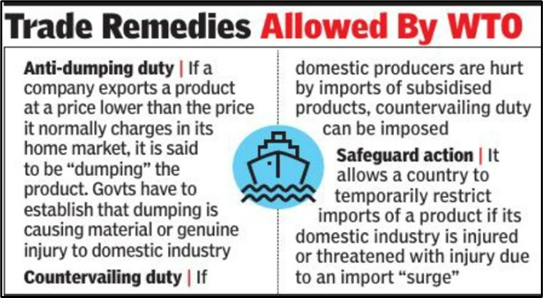Govt Moves on Anti-subsidy; Dumping Levies Under Lens
26-08-2023
12:22 PM
1 min read

What’s in today’s article:
- Different types of trade remedies: Anti-dumping, subsidies, safeguards
- Directorate General of Trade Remedies (DGTR)
- News Summary
Why In News?
- At least two judicial pronouncements have taken a dim view of the finance ministry’s decisions against imposing anti-dumping and safeguard duties.
- Recently, in many cases, the Centre chose not to impose anti-dumping duty.
- This was despite the findings and recommendations of the Directorate General of Trade Remedies (DGTR) establishing adverse impact of cheap or subsidised imports on domestic industry.

Different types of trade remedies: Anti-dumping, subsidies, safeguards
- Binding tariffs, and applying them equally to all trading partners (most-favoured-nation treatment, or MFN) are key to the smooth flow of trade in goods.
- The WTO agreements uphold the principles, but they also allow exceptions — in some circumstances. Three of these issues are:
- Actions taken against dumping (selling at an unfairly low price) – by imposing anti-dumping duties.
- Special “countervailing” duties to offset the subsidies made to producers of these goods in the exporting country.
- Emergency measures to limit imports temporarily, designed to “safeguard” domestic industries.
- A WTO member may restrict imports of a product temporarily (take safeguard actions) if its domestic industry is injured or threatened with injury caused by a surge in imports.
- These duties are extra import duties imposed on goods in addition to the normal duties that apply in the country.
Directorate General of Trade Remedies (DGTR)
- Earlier known as DGAD (Directorate General of Anti-Dumping & Allied Duties), it was renamed in May 2018.
- It works under the Ministry of Commerce and Industry.
- It was formed as a single national entity dealing with all kinds of Trade Remedial measures (anti-dumping, countervailing, safeguard).
- The DGTR provides a level playing field to the domestic industry against the unfair trade practices like dumping, subsidization and surge in imports.
News Summary
Background:
- Recently, the revenue department opted to be selective in imposing anti-dumping or safeguard duties to protect domestic industry.
- E.g., the revenue department decided to unilaterally suspend countervailing duty on certain varieties of stainless steel from China, which was quashed and set aside by the Gujarat high court.
- Many a times, it chose to do so against the recommendations of the designated authority such as DGTR.
- Several Indian companies and industry bodies have gone to court against the revenue department’s these decisions.
- Hearing a set of cases, the Customs, Excise & Service Tax Appellate Tribunal asked the Centre to reconsider its decisions in a bunch of cases where it decided against accepting the designated authority’s recommendations.
- It asked the Centre to give tentative reasons for not accepting the recommendations so as to give the domestic industry an opportunity to submit a representation.
- In several cases, where the revenue department in the finance ministry did not bother to communicate its final decision, the tribunal has taken the same view.
- The law governing anti-dumping cases requires the revenue department to decide on a matter within three months of the DGTR’s recommendations.
Imposition of anti-dumping duty: difference in opinion
- The finance ministry and NITI Aayog are of the view that imposing anti-dumping duty impact other producers in the chain adversely.
- On the other hand, the commerce ministry believes the DGTR recommendations come after establishing adverse impact on domestic producers and are in line with World Trade Organization rules.
- The commerce department is of the opinion that unless such an action is taken, domestic industry will be wiped out.

